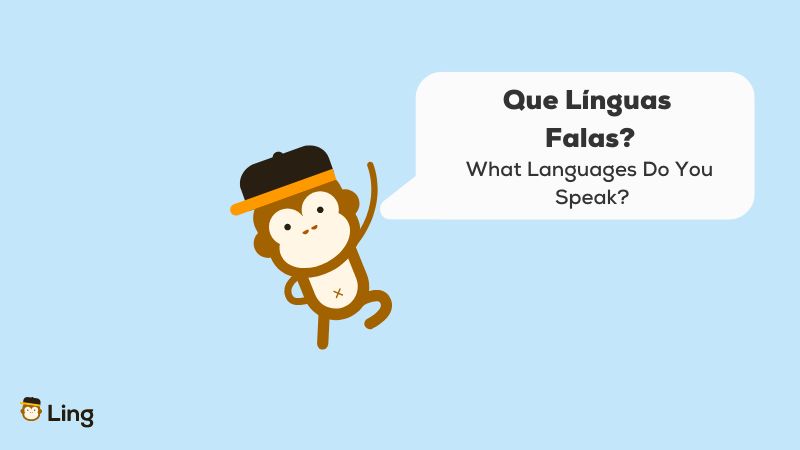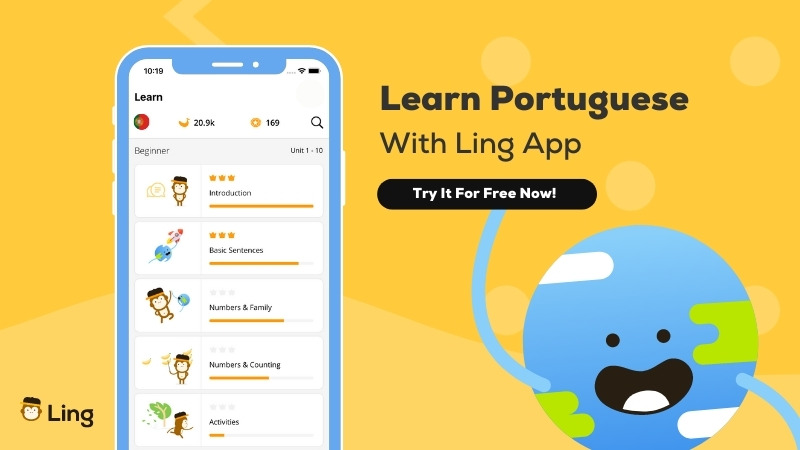The first step to starting a conversation with a stranger is properly introducing yourself and letting them know about you. You may even discover that you have something in common, like your hometown or your birthday. In this article, I’m going to present an amazing guide on how to introduce yourself in Portuguese and start making friends with these warm and welcoming people. Let’s get started!
Let me preface this by saying that I’m not a very outgoing guy. Sometimes, I struggle to talk to strangers and make new friends, especially when I visit new countries where the locals use different languages. Even if you want to connect with the locals and let them get to know you, the language barrier is just too big to overcome. However, I’ve discovered that knowing how to introduce yourself in the local language is a big help and a tremendous tool to ease this process.
In a conversation with a local Portuguese, you will get an impressed look or some laughter from your accent if you start by introducing yourself in Portuguese. Either way, you’ll see that you’ve broken the ice, and it becomes much easier to talk to people!
Note: What I will teach you applies to both European Portuguese and Brazilian Portuguese. There are some minor changes to take note of. Nonetheless, if you use this guide on both countries, you’ll be fully understood!
Simple Greetings In Portuguese

Before you start introducing yourself, you should always extend a greeting to let them know you’re talking to them. Here are a few options:
- Olá – Hello
- Bom dia – Good morning
- Boa tarde – Good evening
- Boa noite – Good night
- Prazer em conhecê-lo – Nice to meet you
- Como está? – How are you?
- Tudo bem? – How are you? (Literal translation is “All good?”)
One thing important to remember is that, in Portuguese, if you’re in an informal situation and you’re talking with strangers the same way or less than you, you can use the word “tu” (second person singular “you”). On the other hand, if you’re talking with somebody older than you or if you want to show respect, you should use the formal word “você” and conjugate verbs to the second person in the plural.
For example, if you’re talking with a stranger the same age as you, you’d ask, “Como estás?” (How are you?) However, if you’re talking with an older person, you’d ask, “Como está?”
Best Ways To Introduce Yourself In Portuguese

After you’ve extended greetings, start introducing yourself in Portuguese and letting other people know some things about you, like your name, age, or where you’re from. Here are a few examples you can use to introduce yourself.
- Eu sou o/a… — I am …
- O meu nome é… — My name is…
- O meu nome é (name), mas prefiro chamado de (name) — My name is (name), but I prefer to be called (name)
Another way to start the conversation is to ask the other person for their name by using the phrase “Como te chamas?”. Again, this is the informal variation using the pronoun “Tu,” while the formal way is “Como se chama?”
Questions To Continue The Conversation
If you’re the first person to tell his name, then the sentences I just showed you are perfect. However, you may want to continue with the conversation. Hence, either you want to ask some questions to know something about the other person, or you may be on the receiving end of one of these questions. Either way, it’s essential to know what they mean and how to respond to them, so let’s have a look at some of the most common questions you may face during a conversation in Portuguese.
Where Do You Live/Where Are You From? — Onde vives?/És De Once?
- Eu vivo em Lisboa – I live in Lisbon.
- Eu venho de Lisboa – I come from Lisbon.
- Eu sou de Lisboa – I am from Lisbon.
What Do You Do? – O Que Fazes?
What Do You Like To Do? – O Que Gostas De Fazer?
- Eu adoro viajar – I love to travel.
- Eu gosto muito de jogar futebol – I like to play futebol very much.
What Languages Do You Speak? – Que Línguas Falas?
- Eu falo português e espanhol – I speak Portuguese and Spanish.
- Eu aprendi francês na escola – I learned French at school.
How Old Are You? – Que Idade Tens?
Examples Of Conversations

Let’s have a look at how all this is used together to form an entire conversation in Portuguese. To make sure that this section will not overwhelm you, we’ll break the conversation into small sentences and practice what they mean below. Once you have mastered those sentences, start building the conversation by adding an answer and a new question.
Example 1:
- Person 1: Olá! Como estás? O meu nome é Miguel – Hi! How are you? My name is Miguel.
- Person 2: Olá! Prazer em conhecer-te. O meu nome é Maria. És de Onde? – Hello! Nice to meet you. My name is Maria. Where are you from?
- Person 1: Eu venho de Portugal. E tu? – I come from Portugal. What about you?
- Person 2: Eu sou de Espanha – I’m from Spain.
- Person 1: Fantástico! Eu aprendi espanhol na escola. Que idade tens? – Awesome! I learned Spanish in school. How old are you?
- Person 2: Tenho 24 anos – I’m 24 years old.
Example 2:
Person 1: Olá! Prazer em conhecer-te. Eu sou o Tiago. – Hi! Nice to meet you. I’m Tiago.
- Person 2: Muito prazer em conhecer-te também! Eu sou a Thaiana. O que fazes? – So nice to meet you too! I’m Thaiana. What do you do?
- Person 1: Eu sou um advogado numa empresa na baixa da cidade. E tu? O que fazes? – I’m a lawyer in a company downtown. What about you? What do you do?
- Person 2: Acredites ou não, eu sou dancarina de samba! Estou de ferias em Portugal mas sou do Rio de Janeiro no Brasil? – Believe it or not, I’m a samba dancer! I’m on vacation in Portugal, but I’m from Rio de Janeiro in Brazil. Where are you from?
- Person 1: Nunca fui ao Brasil! Eu sou daqui de Portugal. – I never went to Brazil! I’m from here in Portugal.
Continue The Conversation At Ling By Learning More Portuguese

Now that you’ve learned the basics of a conversation and started talking with someone you really like, you don’t want to be stuck on only these sentences. After all, it would be best if you learned more Portuguese to be able to spend all night talking to that special someone. Don’t worry because I’m here to help you!
Friends, allow me to present to you, Ling! Ling is a language learning application that will help you master Portuguese in no time. By signing up for an account, you can discover over 60 languages worldwide, including Portuguese, and learn all these on the go. This application uses games, puzzles, and quizzes to engage your mind in learning new languages in a much faster and more fun way.
This application sits perfectly on your phone and is always ready to help you learn anytime, anywhere. With only 15 minutes a day, you can vastly improve your Portuguese and take a step closer to fluency. Download Ling App and come learn Portuguese with us!






















